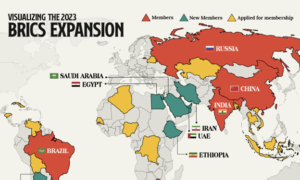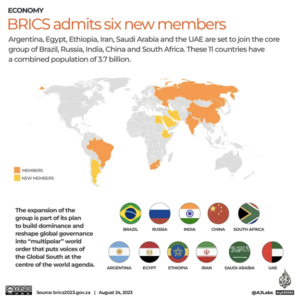BRICS 2.0
Relevance:
GS Paper 2 International Relations
Tags: #rajivbhatia #BRICS #India #upsc #Johannesburg.
Why in the news?
Recently, the 15th BRICS summit was hosted by South Africa in Johannesburg. The summit ended with a major decision to invite six countries — Argentina, Egypt, Ethiopia, Iran, Saudi Arabia, and the UAE — to join BRICS as full members and keep its doors open for further expansion.
BRICS 2.0 will have global repercussions
- At Johannesburg, BRICS increased its membership to represent a larger share of world population, global GDP and international trade by invite six countries.
- The accommodation was important, given that at least 23 countries of the Global South had conveyed interest in seeking BRICS membership. This was a recognition of the grouping’s values.
Therefore, it will also have global repercussions on the:
-
- Role of the US-led Western alliance centered around G7;
- Emerging economies and developing countries, and;
- The engagements between the two worlds.
The significance of adding new countries
- The new BRICS-XI will have more political influence and the extent of its increased influence will depend on building inner unity.
- BRICS 2.0 will also have six of the top 10 oil-producing countries of Saudi Arabia, Russia, China, UAE, Brazil, and Iran — a definite global power shift and one not defined by the West.
- The joint statement made during the summit stated that the grouping will encourage local currencies in trade and financial transactions “between BRICS as well as their trading partners” and for “fast, inexpensive, transparent, safe and inclusive payment systems.
- Therefore, it will also widen the areas of trade and commerce, bilateral and multilateral relation among the countries.
Strengthening the voice for UNSC
- At Johannesburg, the leaders decided to direct the foreign ministers to “further develop the BRICS partner country model”. In line for admission are Indonesia, Vietnam, Bangladesh, Mauritius, Nigeria, Kenya, and a Latin American country.
- Johannesburg Declaration- The immediate rebalancing focus is UNSC membership for the original BRICS members India, Brazil, and South Africa articulated in Paragraph 7 of the Johannesburg Declaration.
- This requires the support of the permanent members, China and Russia, or it will further expose their doublespeak on this issue.
From India’s perspective
- Both UNSC membership and local currency trade are welcome to India. Two other possibilities discussed are favorable too.
- First, it was reiterated that G20 is the premier multilateral forum for “international economic and financial cooperation”.
- China and Russia conveyed their support for the successful hosting of successive G20 presidencies by India, Brazil, and South Africa.
- This generates hope that these two states may become a little more conciliatory, and a consensus-based Delhi Declaration is delivered at the G20 summit in September.
- Second, the meeting between President Xi Jinping and Prime Minister Narendra Modi on the summit’s side lines, may offer fresh impetus for expediting a workable resolution of the border issues in the western sector of Ladakh.
Conclusion
- BRICS faces a changed world in which its two members Russia and China are heavily involved in confrontation with the US-led West.
- The other BRICS members do have differences with the existing global order, but they prefer reform through dialogue. As the six new members join BRICS, these inner dynamics will evolve further.
- However, India will have a seminal but challenging role, given its growing cooperation with the West on the one hand and its active articulation and pursuit of the interests of the Global South on the other.
Mains Question
With respect to the new decision taken on adding new countries to the BRICS what will be the challenges and significance for India?





